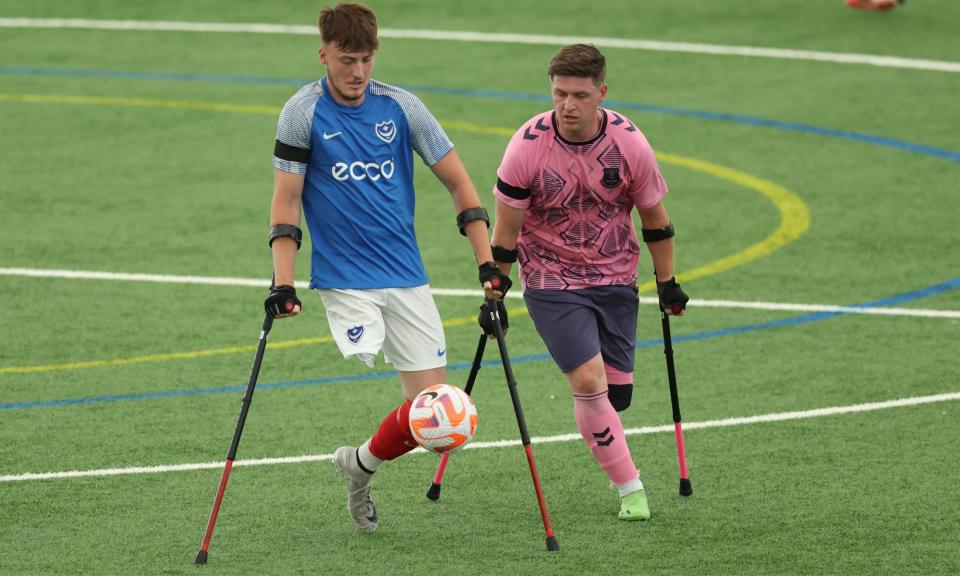‘Bigger than any other’: St George’s Park showcases the best of disability football

“Football Your Way” is the name of the Football Association’s three-year plan to improve disability football at every level. Its impact will be clear this weekend at St George’s Park, where Sean Jackson’s way from Sunday league football on the Isle of Man to an FA Disability Cup final with Everton reflects a sport on the rise.
St George’s Park is staging the largest disability cup competition of its kind on Saturday and Sunday with the eighth edition of the FA Disability Cup. There will be six impairment-specific cup finals – amputee, blind, cerebral palsy, deaf, partially sighted and powerchair – each broadcast live on TNT Sports with highlights on Channel 4. For the England and Everton defender Jackson, the event and the exposure demonstrate how far the sport has come in the seven years since he started playing.
“I was born as an amputee, pretty much, and it took me until I was 16 to come across something on social media about amputee football, that’s how I first got into the sport,” says Jackson, part of the England team that reached the semi-finals of the recent European Championship. “I grew up on the Isle of Man and there wasn’t any disability sports at all. I got chucked in with playing able-bodied football and played that from the age of four. I was a goalkeeper who would just kick it long using my prosthetic leg and then suddenly I was being put on crutches and having to learn how to use them and to kick with my left foot. It probably took two or three years to adapt.
“Now I feel like the sport is everywhere. We’ve got social media teams raising the profile, our league fixtures are streamed live on Facebook and YouTube, there are more people coming on board as volunteers with England and personally I’ve been involved in a couple of things on TV [such as an advertisement for Sure deodorant] that has shown disability football on UK television. Across all of disability football it’s got a lot bigger and there’s a lot more interest. This event at St George’s Park is the biggest thing we have in the UK.”
Everton face Portsmouth in the Amputee Cup final, the first contest of the weekend and a repeat of last season’s final that Everton won 4-2. Birmingham Futsal play Scorpions Futsal for the Partially Sighted Cup, the Royal National College for the Blind meet West Bromwich Albion in the Blind Cup final and West Brom also play Aspire in the Powerchair Cup final. Chelsea Foundation face Norwich Community Sports Foundation in the Cerebral Palsy Cup final before the event finishes with Farsley Celtic against St Johns in the Deaf Cup final. Tickets for each final cost £5 for adults, £2.50 for children. The “experience area” at St George’s Park will enable fans to simulate some of the disability football formats being showcased.
“If you’d told me five years ago I’d be doing interviews for The One Show, the Guardian, Radio Norfolk and playing live on TNT Sports I would have laughed at you, but now it is actually happening – it is a pinch-yourself moment,” admits Josh Wilde, a striker for the Norwich cerebral palsy team that has won the league for the past two seasons. “The standard of each individual sport is increasing massively. Participation has increased too. It’s similar to what we saw with the women’s World Cup when the standard and publicity went through the roof in the seasons that followed. I think a similar thing is happening in disability sports now by having a big event like this to get eyes on it.”
Raising the profile of disability football is just one aspect of the FA’s plan. “Football Your Way” also aims to increase the number and quality of coaches, build support for elite players and grow participation at every level, including the number of women involved. Many of the formats are mixed gender but male-heavy.
Everton’s Rhyce Ramsden, who scored twice and was named player of the match in last season’s amputee final, believes this weekend’s game is “bigger than any other we play” and can help increase awareness. “Someone watching might not have a disability themselves but they might know someone who does, or a child who does, and let them know there is amputee or blind or powerchair football they can get involved in,” says the England international. “Even though we want to win we also want to showcase what amputee football is all about. It’s not slow or careful, it’s pretty much the closest disability sport to mainstream football in terms of the speed, the tactical side and the allegiance that fans feel towards their team.”
Ramsden admits participation in the amputee game does need to improve. He explains: “The FA do a great job putting this event on for us and showcasing the sport. Everton in the Community are great as well, whether it is sorting out our training sessions, kit and coaching. The downside at the minute is the league only has three teams. There used to be eight teams but the rules changed a few years back in line with international football, so all outfield players have to be on crutches and a goalkeeper has to have one arm, whereas in the past the league would let people play on a prosthetic. Some people prefer to play on a prosthetic over crutches so the amount of players has dropped.
“We are trying to bring the standard up and get more people involved. Myself and a couple of lads in the other teams also play in Poland. The Polish league includes eight teams with at least 15 players in each squad. We want it to be like that in England and hopefully one day be able to attract foreign players to our league and have a full league.”

 Yahoo Sport
Yahoo Sport 






































